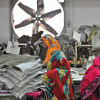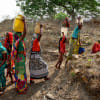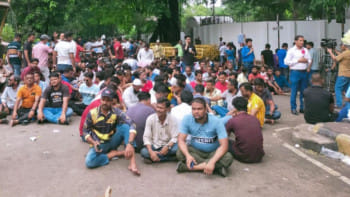Empowering women, sustaining the environment

The symbiotic relationship between women and the environment has been taken into serious consideration recently in Bangladesh. Despite the country's amazing geographical landscape, its vulnerability to frequent natural disasters and other environmental challenges is well-known. Amid these multifaceted challenges, there is a story of interconnectedness of women and the environment.
Women in rural areas often bear the responsibility of collecting water, fuelwood and food. Women are also closely engaged in agriculture and farming. As climate change is becoming the order of the day, leading to extreme weather events frequently, access to resources like water, fuelwood and food is becoming challenging. This also jeopardises crop yields in many areas. For instance, the coastal regions of Bangladesh are experiencing rising sea levels, leading to salinity intrusion and the degradation of arable land. Women who rely on agriculture for their livelihoods are hit the hardest.
In response, some organisations have stepped in to equip women with the knowledge and tools needed to cultivate climate-resilient crop varieties and practise sustainable agriculture. This not only helps women adapt to the shifting environmental landscape but also bolsters food security. Some of the organisations provide training to and, in some cases, employ women to install and maintain solar panels in the country's off-grid areas. The link between renewable energy and women's economic empowerment is thus strengthened.
Another critical domain where women in Bangladesh play a central role is water management. Many parts of the country have been facing a water crisis in recent years. Women often bear the responsibility to manage safe water for their families and thus are affected by the challenges related to the water crisis. For this, many development projects promote women's involvement in decision-making and water resource management, underscoring the vital link between women and the preservation of safe water.
In Bangladesh, women are also regularly at the forefront of disaster preparedness and relief activities. NGOs such as the Bangladesh Red Crescent Society have recognised and harnessed the resilience and resourcefulness of women in managing these crises. They train women in disaster response and risk reduction, effectively creating a network of local environmental first responders.
Moving to the urban setting, where women's health and well-being are disproportionately impacted by air pollution and poor waste management, the intersection of gender and environmental issues is particularly important. Women who work in the informal waste management sector in Dhaka, for instance, are not provided with adequate sanitation facilities and are subjected to hazardous conditions. There are initiatives that are addressing these challenges by promoting sustainable waste management practices and providing safe working conditions.
The intersection of women and the environment goes beyond immediate challenges. It extends to the broader context of women's participation in decision-making processes related to environmental policies and practices. Women's voices are essential in shaping sustainable and equitable development. Countries in the South Asian region, like Nepal, have made progress in this regard, with women participating in community forestry management and biodiversity conservation efforts. In addition, a recent study showed that the increased participation of women farmers in decision-making can benefit farming productivity as well as conservation.
It is clear that the intricate web of interconnectedness and intersection between women and the environment in Bangladesh demands our attention and action. Communities that are resilient and innovative will benefit by utilising women's potential as agents of change in terms of environmental sustainability. By promoting gender-inclusive policies and initiatives, we can support women's empowerment while also fostering environmental sustainability and laying the groundwork for a more sustainable future.
Arifur Rahaman is lecturer of sociology at Gono University in Savar, Dhaka.
Sadia Binta Zaman is lecturer of sociology and anthropology at Green University of Bangladesh.
Views expressed in this article are the author's own.
Follow The Daily Star Opinion on Facebook for the latest opinions, commentaries and analyses by experts and professionals. To contribute your article or letter to The Daily Star Opinion, see our guidelines for submission.

 For all latest news, follow The Daily Star's Google News channel.
For all latest news, follow The Daily Star's Google News channel. 











Comments